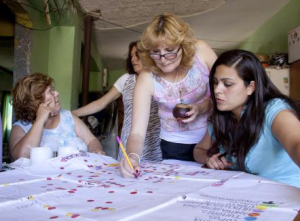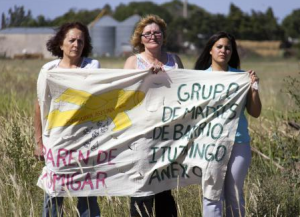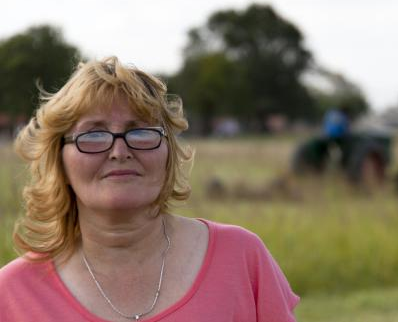
Photo courtesy of the Goldman Environmental Prize.
When Sofia Gatica’s 3-day-old daughter died from kidney failure, she didn’t connect it with an environmental problem. It was only as she noticed neighbor after neighbor developing health problems that she started to wonder about the agrochemicals that were being sprayed on the farms nearby.
“I started seeing children with mouth covers, mothers with scarves wrapped around their heads to cover their baldness, due to chemotherapy,” she told me recently through a translator. It was then, Gatica says, she knew something was seriously wrong.
Her city, Ituzaingó, Argentina, is surrounded by soybean fields where farmers use some of the same chemicals used on crops grown in the U.S. — chiefly glyphosate, the main ingredient in Monsanto’s weed killer Roundup. But in Ituzaingó, the industrial-scale farms that grow soybeans for export have crept right up to the edge of the residential community, and many of the chemicals are sprayed aerially, allowing them to drift wherever the wind or water will take them.
“There are soybeans to the north, to the south, and to the east, and when they spray, they spray over the people because there’s no distance,” Gatica said, adding that some homes are less than five yards from where the fields start.
But thanks to the actions of this working-class mother, and the international movement she has built against Monsanto, things in Argentina are slowly changing. And, as one of this year’s recipients of the Goldman Environmental Prize, Gatica now has a chance to inspire those in farm communities around the world.
A few years ago, Gatica co-founded the Mothers of Ituzaingó, a group that started going door to door to find out more about the health problems in its community. This would become the first epidemiological study of the area and produced some shocking results: high rates of neurological and respiratory disease, birth defects and infant mortality, and cancer rates 41 times the national average.

Photo courtesy of the Goldman Environmental Prize.
Then Gatica and her fellow activists mobilized a loud and public response to these problems. “We blockaded the spraying machines. We would get into the fields to block them,” she said. “We carried out protests at the Ministry of Agriculture and the Health Ministry. We took sick people to the ministry.”
And they found researchers to study the links between the increasing health problems and the pesticide spraying. “We were able to verify that people have three to four agricultural chemicals in their blood: endosulfan, heptachlorine, hexachlorocyclohexane,” as well as others, she said.
Endosulfan has been banned in more than 80 countries because it is so toxic to the environment and human health, and it was added last May to the U.N.’s list of persistent organic pollutants to be eliminated globally — but it was permitted for use in Argentina until the Mothers of Ituzaingó’s activism ultimately led to a ban, which is expected to go into effect in 2013.
According to Gatica, a report from four months ago found that cancer kills 33 percent of Ituzaingó residents. “So they sent in more doctors to our community. But that is not the solution,” she said. “What we are proposing is not to plant, so that there’s no need to fumigate near residential areas or waterways.”
Moving soy production far from people’s homes may still be a ways off, but Gatica has plenty to show for her activism.
Over the last several years, municipal ordinances have been passed around the country creating mandatory buffer zones between aerial spraying and residential areas. In 2010, Argentina’s Supreme Court ruled that agrochemicals could not be sprayed near populated areas — and that the burden of proof would be shifted so that rather than residents having to prove chemical spraying causes health problems, the government and soy producers must prove them safe (an approach that industry lobbyists have kept from happening here in the U.S.).
But these victories have not been easy.
“To be able to get things done in the community, we’ve had to give up some rights,” she said. For example, the Ituzaingó residents had to sign a waiver agreeing not to sue an agribusiness in order to get drinking water that wasn’t contaminated with pesticides.
And then there are the more direct threats that Gatica and her family have faced.
“Somebody came inside my house with a weapon. I was told not to ‘screw around with the soybeans.’ I would get phone calls where I’d be told that I would only have two children the next day,” she said. Asked if she ever found out who was behind these personal attacks, she said, “I had the police investigate this, but I was told that the file was secret.”
None of this has stopped Gatica, who is spearheading a South America-wide resistance to Monsanto and the industrial model of agriculture it represents.
“We’ve been to Brazil, Ecuador, Paraguay, Chile, and many places within our country where we tell of our experience and we show people how to defend their rights,” she said. Gatica and the other mothers remind people that the government’s job is to serve the public. “We are the ones paying their salaries and they have to respond to us,” she reminds activists.
Gatica plans to establish a foundation with the money from the Goldman Prize to fund more research into the presence of agrochemicals in the bodies of Ituzaingó residents. She says most studies are carried out by the government and find that agrochemical levels fall within allowable limits. But, she said, “our bodies don’t have to have any agrochemicals.”
And the larger, longer-term struggle is against Monsanto. While it’s not the only agrochemical company with a presence in the area, she said, “it’s the biggest one. Monsanto is the one that’s basically appropriated all of Argentina with no consideration.”
Gatica also hopes to see the U.S. government play a greater role in reigning in seed and pesticide-producing multinationals, so there may be less of a ripple effect elsewhere in the world. She told me she hopes “that the government itself brings to trial these multinationals, who are causing so much harm to many countries, and giving your country a bad name.”



